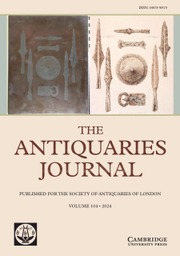Article contents
Belgic and other early pottery found at North Ferriby, Yorks. With comments on pre-Claudian Romano-Gaulish influence in Britain
Published online by Cambridge University Press: 08 January 2012
Extract
In the summer of 1932 two young geologists, Messrs. C. W. and E. V. Wright, while examining the low cliffs of the Humber Bank, near North Ferriby, noticed dark patches of black earth containing bones and sherds (Y.A.J. xxxi, 199). The material collected by them from these pits at various times since then forms the principal subject of this paper.
- Type
- Research Article
- Information
- Copyright
- Copyright © The Society of Antiquaries of London 1938
References
page 262 note 1 Excavations at the Roman Town at Brough, East Yorkshire, by Corder, Philip and Rev. T. Romans, 1933–1937, University College, Hull. Four Interim ReportsGoogle Scholar.
page 264 note 1 T. Sheppard, A Collection of Roman Antiquities from S. Ferriby, Hull Museum Publications, nos. 38, 39, 64, 65.
page 264 note 2 Brough, iv, figs. 10–12.
page 264 note 3 We wish to express our indebtedness to Mr. M. R. Hull for information on various points. The facilities afforded us of inspecting his photographs of Colchester types and of comparing the North Ferriby pottery with similar ware, recovered from the Sheepen site at Colchester, have been much appreciated.
page 267 note 1 Some occupation continued into the early first century A.D., cf. op. cit., p. 164.
page 271 note 1 The possibility of river-transit, in one direction or other, should not be overlooked.
page 271 note 2 Strabo, Geographia, ii, 153; iv, 278.
page 271 note 3 Silchester and Camulodunum are outstanding examples in the archaeological field.
page 271 note 4 Amongst these sites may be mentioned Haltern, Xanten, and Neuss (Sels tilery). The contents of the early grave-groups at Trier strikingly illustrate the period of these classes of pottery.
page 272 note 1 The chronological importance of these facts will be appreciated when it is stated that throughout its life the settlement of Sheepen remained in native occupation, and that evidence is accumulating to the effect that the earliest Roman military station must be placed in the more plateau-like area, now largely occupied by Colchester itself.
page 273 note 1 It is, of course, not suggested that the production of the butt-beaker ceased suddenly and at the same time on all sites; but the rarity of the early type-form on definitely Claudian sites cannot be too strongly emphasized.
page 273 note 2 Very rarely examples with the early bevelled rim have been found on Claudian sites. See Richborough, iii, 277, from the ‘rapid' silt of the Claudian ditch. Probably imported by the invading army, as also the two SENICIO bowls (ibid., iii, pl. xxii, 1, 2), found in the same ditch.
- 6
- Cited by


